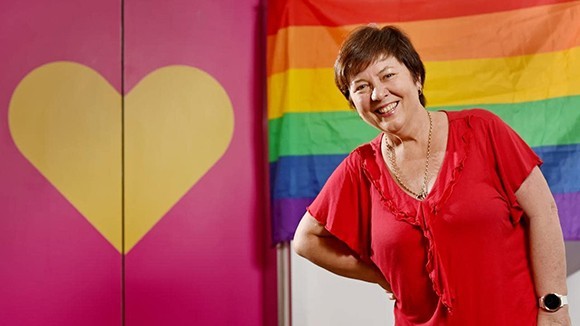
BEFORE that infamous night in 1978 when 53 gay, lesbian and transgender activists were arrested in Kings Cross at the first Sydney Mardi Gras, many other passionate demonstrators were handcuffed in their fight for equality.
Julie McCrossin was among them.
Back when homosexuality was a criminal offence. Considered evil. A mental illness.
In 1974 Penny Short lost her Teacher’s College Scholarship after she published a lesbian love poem in the Macquarie University student newspaper.
In 1975 a teacher in a Catholic school, Mike Clohesy lost his job after he appeared on ABC TV advocating for the decriminalisation of homosexuality.
“I was one of many people arrested at demonstrations in support of Penny and Mike,” Ms McCrossin said.
“At the time I was so outraged at the cruelty of the attitudes to homosexual people, I felt angry and determined to keep protesting until we achieved change.
“You felt a tremendous bond with your fellow activists and a sense of adventure and hope for a better future.”
After attending her first Gay Liberation meeting in 1973, Ms McCrossin, was there right at the start of the long road to marriage equality.
“If you had told me, as a young university student, it would take 44 years before we achieved the right to marry, I don’t think I would have believed it.
“We were impatient for change. But nothing was going to stop us fighting for what was right and fair.”
After being treated for stage four cancer in 2013, she married her partner Melissa Gibson in Manhattan in 2014.
Ms McCrossin, of Annandale, was appointed a Member of the Order of Australia (AM) for her significant service to the community, particularly through LGBTIQ advocacy roles, and to the broadcast media.
The 64-year-old assumes the criminal record of her arrests and convictions still exists in a “dusty, paper file in a state government storage cupboard”.
“However, I don’t think of myself as brave for standing up to unjust laws,” she said.
“Fighting for change was a psychological necessity in that era. Many people took their own lives because of the hostility of family, psychiatry and faith groups.
“Speaking out in the media and asserting that homosexuality was a normal part of human sexuality was a life saving experience. And it still is.
“The biggest achievement was the early Gay Liberation idea of coming out to friends, family, workmates and the media as a political strategy.”
While the Uniting Church welcomes LGBTQI people, there is an ongoing battle to be accepted and welcomed into most faith communities.
“The current demands for new legal protections for so-called religious freedom are a fight back from conservative forces in our community who oppose the acceptance of sexual diversity,” she said.
“It should no longer be possible for gay and lesbian teachers to be sacked from religious schools, or for students to be expelled or made to feel abnormal for being gay or transgender. This is the next big fight in Australia.”
Ms McCrossin is also well known as a broadcaster with ABC Radio National for 20 years.
She was also a team leader on the media quiz show Good News Week on Network Ten and ABC TV for five years.
“The highlight of my broadcast career was the first three years of the original Good News Week media quiz show on ABC TV in the late 1990s,” she said.
“At its best, it was intellectual vaudeville with articulate guests from across Australia’s cultural, comedy and political communities.
“We brought a wide range of Australian musicians and singers to a national audience. It was anarchic, amusing and thought-provoking entertainment.”
Julie McCrossin was arrested many times for her activism.
(AAP IMAGE / Troy Snook)
Originally published: January 25, 2019, Kate Bastians, Inner West Courier